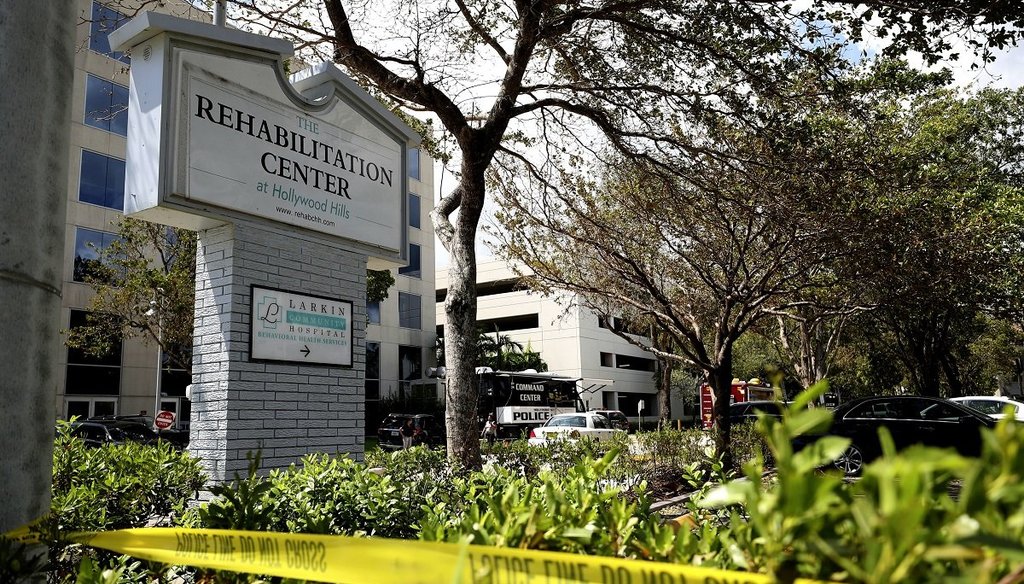

Our only agenda is to publish the truth so you can be an informed participant in democracy.
We need your help.


Nursing home photo
Republican lawmakers allocated $30 million in state funding for nursing homes in the 2017-19 biennial budget, which grew to a $74 million boost when matched with federal dollars
Carpenter’s assertion to back up his claim that state spending on nursing homes is decreasing is true, but that’s because fewer Medicaid recipients are choosing to reside in nursing homes
Nursing homes in Wisconsin have been hit hard by the coronavirus.
One in four facilities in the state have had at least one case of COVID-19, and Gov. Tony Evers in late May directed $100 million in federal CARES Act funding to nursing homes and other long-term care providers to ease the financial burden of the pandemic.
How the state funds its nursing homes, then, became the subject of a May 23, 2020, Twitter exchange between state Rep. Jim Steineke, R-Kaukauna, and state Sen. Tim Carpenter, D-Milwaukee.
Steineke, who has said he believes Evers should have allocated more of the federal money to nursing homes, asked whether Carpenter also thought the facilities should have received a bigger piece of the CARES Act pie.
Carpenter responded, "Why didn’t the GOP increase state funding for nursing homes in the last budget?"
Did nursing homes get a boost from the state in Wisconsin’s last budget, or is Carpenter correct?
Let’s dig in.
Evers sought to expand Medicaid and free up state tax dollars in the 2019-21 biennial budget by tapping into $1 billion in federal funds through the Affordable Care Act.
Republican lawmakers on the Joint Finance Committee rejected that effort, but did allocate an additional $30 million in state dollars to nursing homes.
For every 41 cents the state spends on most Medicaid programs, the federal government will spend 59 cents, meaning the full increase in funding for nursing homes in the current biennium totaled about $74 million.
So the GOP did increase state funding for nursing homes in the last budget — just through state tax dollars, instead of Evers’ proposed reliance on federal funds.
When asked to provide evidence to back his claim, Carpenter pointed to a May 28, 2020 memo from the Legislative Fiscal Bureau — which he sought — detailing declining state and federal spending for medical assistance fee-for-service payments to nursing homes. That data does show the expenditures have been dropping since at least the 2011-12 fiscal year.
These payments designate how much money the state and the federal Medicaid program are paying nursing homes to care for seniors with limited resources.
But the state is not spending less because state lawmakers failed to fund nursing homes. The state is spending less because fewer Medicaid recipients are choosing to live in nursing homes.
Care recipients are increasingly preferring to reside in non-nursing home settings, the memo says, favoring home and community-based settings or smaller, more home-like assisted living facilities.
The total number of days that Medicaid pays for a senior in a Wisconsin nursing home has dropped nearly 40% in the last decade or so, from about 6 million days during the 2010-11 fiscal year to about 3.7 million days during the 2017-18 fiscal year, the memo says.
As a result, with fewer days to pay for, spending declines.
Meanwhile, the state has increased the dollar amount paid per day to nursing homes.
In 2017, that rate was $174.61, according to a Department of Health Services spokeswoman. In 2018, it was $181.08, and in 2019, it was $191.50. The 2018-19 fiscal year’s average daily rate is approximately 17% higher than it was during the 2010-11 fiscal year, the memo says.
That said, even as rates increased, as the number of days paid decreased, total spending dropped.
And, in any case, Carpenter’s claim was limited to GOP actions in the most recent budget, not any decline over time.
Carpenter claimed Republicans didn't "increase state funding for nursing homes in the last budget."
But they did increase funding for nursing homes in the 2019-21 biennial budget, allocating $30 million in state dollars. When the federal match is included, that added up to about $74 million more.
Carpenter cited declining overall state spending on nursing homes, but the reason those expenditures decreased is because fewer Medicaid recipients are residing in nursing homes. Meanwhile, rates charged for those Medicaid recipients have increased over the years.
We rate Carpenter’s claim False.
Milwaukee Journal Sentinel, "1 in 4 Wisconsin nursing homes hit by COVID-19, data show. One facility reports 57 deaths," June 4, 2020
Milwaukee Journal Sentinel, "Gov. Tony Evers to give $100 million in federal funding to nursing homes and other care facilities to fight COVID-19," May 21, 2020
Wisconsin state Legislature, 2019-21 Biennial Budget Comparative Summary of Provisions: Health Services, accessed June 23, 2020
Milwaukee Journal Sentinel, "Republicans pass $588M increase for health care programs without Tony Evers’ Medicaid expansion," June 4, 2019
Milwaukee Journal Sentinel, "GOP health budget will cost the state more and spend less on health programs than Gov. Evers’ budget," June 21, 2019
Legislative Fiscal Bureau memo regarding state spending on skilled nursing facilities, May 28, 2020
Email exchange with Elizabeth Goodsitt, communications specialist, Wisconsin Department of Health Services, June 24, 2020
In a world of wild talk and fake news, help us stand up for the facts.
